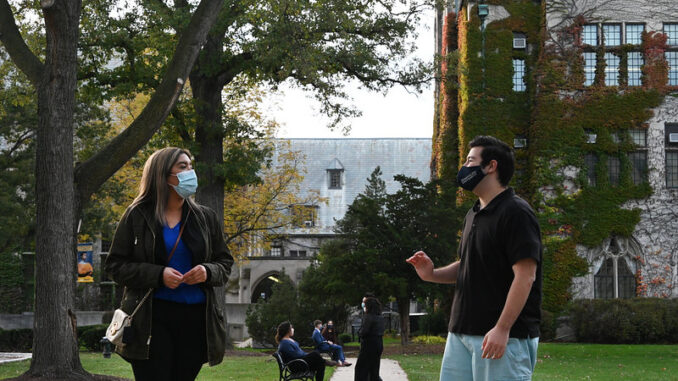
By Rachel Huser
Dominican student workers are seeing an extra dollar an hour in their paychecks thanks to the state’s increase in the minimum wage this year – from $10 to $11 an hour.
Junior Jessica Spaulding found the increase in pay a welcome surprise.
“Since student workers are often limited in the number of hours they work per week, the increase in the minimum wage is a nice boost to my monthly paycheck,” she said. “It might not seem like much, [but] it’s always nice to have a little bit of extra cash for books or other school fees and, of course, getting some take-out now and then.”
Dominican had been ready for the extra expense that started with students’ February payroll.
“In 2019, the state released a five-year increase schedule so that we can build that into our budget planning each year,” said Ange Reda, senior human resources generalist.
The five-year schedule will follow a $1 increase each January until the hourly minimum wage is $15 on Jan. 1, 2025. Because Dominican is required by state law to pay the minimum wage, the university will also follow this schedule. More details can be found in the state’s press release.
For students who also work outside Dominican, like freshman Kiara Valenzuela, the raise is less noticeable. The increase only matches the wages that she earned at her primary job at Jewel-Osco before switching to Amazon Grocery.
“A dollar is a dollar,” she said. “It’s nice to pay for gas, but Dominican could do better.”
The university spends over $2 million each year on student jobs, said Mark Titzer, vice president for finance and treasurer.
Titzer is unsure how Dominican will handle the minimum wage increase in the coming years. He fears that hours and maybe student workers may have to eventually be cut. He mentioned that fewer and better jobs could be a solution. However, this would not go into effect for some time.
He and Barrington Price, vice president of student success and engagement, are looking to tailor student jobs toward more pre-professional goals.
Titzer wants students to gain experience from their on-campus jobs that they can use after graduation.
“We are trying to be thoughtful about it,” he said.
For the rest of this school year, individual departments will be handling their budgets to accommodate this new increase.
Titzer is not as concerned with this short term situation because fewer students are on campus and departments have less of a need to employ. He hopes that altering student jobs toward more professional ambitions can be the long term solution to higher pay in more meaningful student work.
Titzer stated that he and Price want to eventually ask students their thoughts on what they want to see in their on-campus jobs.
“The hope is that we can better employ students,” he said
rhuser@my.dom.edu



